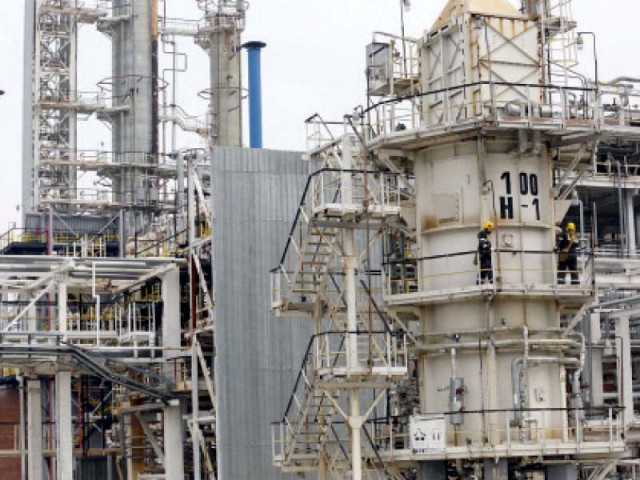Crude awakening as banks freeze credit lines
Oil firms finding it difficult to import crude oil, petroleum products at high prices

Prices of petroleum products, particularly petrol and diesel, have gone up significantly in the last few weeks and more hikes could be on the cards with the government setting an ambitious target in the new budget to raise Rs750 billion by charging the petroleum levy.
At this time, if the country witnesses fuel supply issues, then that will aggravate the government’s problems and people’s woes. Unfortunately, this is where the country might be heading since the petroleum companies are facing a credit crisis that can hurt fuel supplies.
Pakistan has been hit by the double whammy of increase in crude oil prices in the international market and decrease in the value of the local currency.
In the last 12 months, oil prices have nearly doubled from $61.89 to $124.42 a barrel (Brent crude). Meanwhile, the Pakistani rupee took a hit and was trading around Rs208 against the US dollar in the inter-bank market, up from Rs155 a dollar 12 months ago.
As a result, in terms of Pakistani rupee, the price of one barrel of crude oil surged by a whopping 164%.
To soften the blow on the consumer, the government gave billions of rupees in fuel subsidies and lost substantial revenues by removing the petroleum levy. But a country with poor financial health that is seeking an IMF bailout can no longer continue doing so.
With the recent complete removal of subsidies and the potential re-introduction of petroleum levy, fuel prices at petrol pumps might increase.
The Consumer Price Index (CPI)-based inflation reading has already risen by double digits in the last 11 months and will likely remain elevated in the near future due to high crude oil, oil product as well as edible oil prices.
The policymakers who think that the abovementioned might be the worst of it are up for a rude awakening. As per recent reports, the banks have frozen credit lines of petroleum firms in the wake of default of a major oil marketing company (OMC).
Ideally, following the OMC’s default, the banks should have tightened their lending mechanisms, instead of limiting the entire petroleum sector’s access to bank loans.
But now that the banks have gone down this route, it is causing a liquidity crisis in the petroleum sector. With the exception of a few state-backed organisations, most OMCs and refineries are struggling with low levels of cash.
Remember, for the Pakistani companies, the capital requirements for buying crude oil have gone up sharply, as indicated earlier, due to the high oil prices and rupee depreciation.
The petroleum companies now need 160% more rupees than a year earlier to buy the same quantity of crude oil.
Moreover, the petroleum product demand has also been growing. The petroleum consumption in Pakistan for FY2022 seems to be on track to grow by 15%.
As a result, petroleum companies need access to enhanced credit lines than before to procure greater quantities of crude oil and refined products at a much higher price.
However, with banks putting a hold on credit limits, the petroleum companies are finding it difficult to import crude oil and petroleum products in a timely manner.
Due to the freeze on loan facilities, some refiners, including a Karachi-based company that runs Pakistan’s biggest oil refinery, are also unable to run their plants at maximum capacity. Therefore, the country’s production of petrol and diesel has come under pressure.
All of this is happening at a particularly bad time since the premiums (including gross refining margins) on petrol and diesel have risen to abnormally high levels in the international market. Pakistan has no other option but to import these fuels at exorbitant prices and lose foreign exchange.
With the stagnant credit ceiling, the petroleum companies from the private sector might not be able to import as much crude oil and fuel as they normally would.
The burden will then shift to government-backed companies like PSO. But it would be unreasonable to expect PSO to do the work of several privately-held petroleum firms, particularly since the state-owned company has to deal with its own problems.
PSO has seen a massive increase in its overdue receivables, linked with LNG supplies and oil product subsidies, which climbed by Rs90 billion in the third quarter to Rs305 billion, as per its latest financial report.
Oil subsidies have hurt the liquidity of all OMCs and PSO, being the industry leader with approximately 50% share in the retail market, is also feeling the pain.
Besides, PSO, which is also the dominant player in the gas market, has been embroiled in the massive energy sector circular debt.
If private-sector oil companies curtail imports and government-owned organisations are unable to meet the shortfall, then we may have a fuel crisis. This means that in addition to high prices, the consumers might also face petrol and diesel shortage.
That being said, this potential disaster can be averted if the authorities take tangible steps to improve the liquidity of oil companies.
This can be done by allaying concerns of banks and encouraging them to boost the credit lines of oil firms so that the OMCs and refiners can ensure smooth supplies of fuels throughout the country.
At the same time, the oil companies should be asked to fully utilise the enhanced credit facilities and improve refinery throughput to push domestic production of petrol and diesel higher and play their part in saving foreign exchange.
The writer focuses on subjects of business and economics, specialising in the energy sector
Published in The Express Tribune, June 20th, 2022.
Like Business on Facebook, follow @TribuneBiz on Twitter to stay informed and join in the conversation.



















COMMENTS
Comments are moderated and generally will be posted if they are on-topic and not abusive.
For more information, please see our Comments FAQ